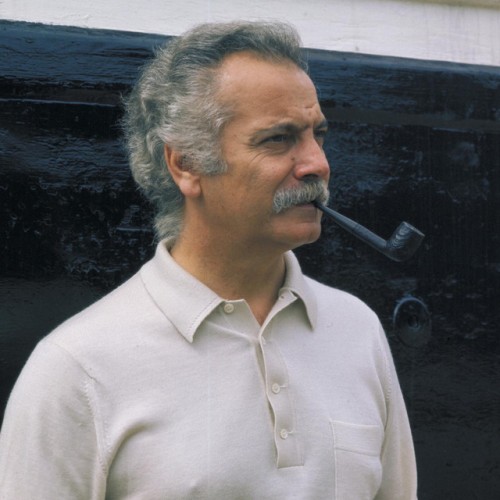
Find musicians who like Georges Brassens like you
- 42 albums
- 0 member like this artist

Georges Brassens was born in Sète, a small port town in the south of France, into a modest family. Raised in a cultural environment where music and literature were appreciated, he developed an early passion for reading and poetry. His mother, of Italian descent, and his father, a freethinking entrepreneur, played pivotal roles in shaping his love for words and music.
As a young man, Brassens struggled with minor delinquency but found refuge in literature. In 1940, during World War II, he moved to Paris, where he was later forced into labor in Germany through the Service du Travail Obligatoire (STO). He managed to escape and found shelter with a family friend, Jeanne Planche, where he lived for several years and began writing his first songs.
Musical Career
Brassens' musical career took off in the early 1950s in the vibrant cabaret scene of Paris. Performing at venues like "Le Cheval d'Or" and "Liberty’s," he caught the attention of singer and cabaret owner Patachou in 1952. She helped him gain access to larger stages and introduced him to wider audiences.
His first record, released in 1952, included songs such as "Le Gorille" and "Brave Margot", which immediately showcased his wit, lyrical complexity, and anti-establishment leanings. As his career progressed, Brassens became one of France’s most beloved chanson singers, with hits like "Les Copains d’abord", "La Chanson pour l’Auvergnat", "Le Parapluie", and "Les Amoureux des bancs publics" becoming iconic.
In 1954, Brassens won the prestigious Grand Prix de l’Académie Charles Cros for his album Le Vent. His health began to decline in the 1970s, leading him to retire from the stage in 1977, although he continued to compose and write until his passing in 1981.
Musical Style and Influences
Brassens was renowned for his unique approach to music, which revolved around simplicity and clarity. His songs were primarily guitar-based, often accompanied by minimal instrumentation, allowing his lyrical prowess to take center stage. His style is rooted in the chanson française tradition, blending elements of French folk music with subtle harmonies and rhythmic flexibility.
Lyrically, Brassens was a master of language, employing wit, humor, and satire to explore themes of love, freedom, death, and social criticism. His songs often contained a strong anarchist streak, rejecting societal norms and institutions. His work reflects an intellectual depth, full of irony, wordplay, and clever metaphors.
Brassens was heavily influenced by classical French poets like François Villon, Paul Verlaine, and Victor Hugo, as well as by fellow chanson singer Charles Trenet, whose melodic simplicity inspired Brassens' own compositions. His work also bears traces of medieval ballads and folk storytelling traditions.
Themes and Philosophy
Brassens was a libertarian at heart, and his songs frequently challenge conventional norms and institutions, particularly the church, the state, and social hypocrisy. His song "Le Gorille" ridicules the death penalty and the judiciary, while "La Mauvaise Réputation" celebrates the right to nonconformity and individual freedom.
Despite his sharp critiques, Brassens' work often conveys warmth and empathy for outsiders and those on the margins of society. In "Chanson pour l’Auvergnat," he expresses gratitude to those who show kindness to the downtrodden. His worldview is grounded in humanism and a deep love for liberty and friendship.
Influence and Legacy
Georges Brassens remains one of the most influential and celebrated artists in French music history. His influence transcends music, extending into French literature and poetry. Many French artists, such as Renaud, Maxime Le Forestier, and René Aubry, have cited Brassens as a major influence.
Brassens’ poetic style and sharp wit continue to inspire generations of songwriters and poets. His legacy is honored through tributes, festivals, and public spaces named after him, particularly in his hometown of Sète, where his memory is celebrated annually.
Conclusion
Georges Brassens revolutionized French chanson with his poetic depth, intellectual lyricism, and fearless spirit. His songs are timeless, offering a blend of humor, humanity, and social critique that continues to resonate across generations. His contribution to French music and culture remains unparalleled.
To connect to musicians and people here you need to be a member. If you have already an account, just login! Otherwise register and become a member today, it's free!
Register new account